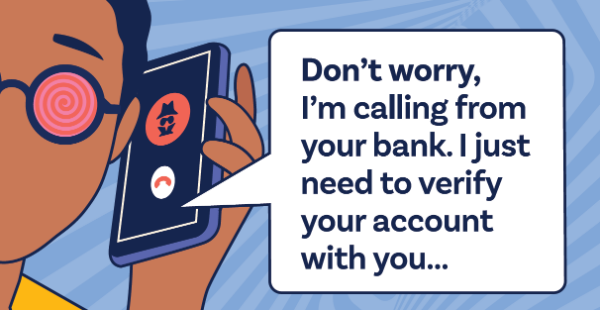
Can you spot a scam?
Every day, thousands of people fall victim to fraudulent emails, texts and calls from scammers pretending to be their bank, a loved one, the government or law enforcement. And in this time of expanded use of online and mobile banking, the problem is only growing. In fact, the Federal Trade Commission’s report on fraud estimates that American consumers lost a staggering $12.5 billion to phishing scams and other fraud in 2024 — an increase of 25% over 2023.
These criminals are skilled at tricking you— convincing you to trust them, pay them and act fast. It’s time to snap out of it.
At Waukesha State Bank, we’re committed to helping you spot scams. We’ve joined the American Bankers Association and banks across the country in a nationwide effort to help you realize when you’re under a scammer’s trance and snap out of it so you avoid losing your money.
We want every bank customer to become a scam-spotting pro — and stop these criminals in their tracks. If something feels off, stop, take a breath and trust yourself.
Red flags to look out for:
- You’re pressured to log into or send money with payment apps — Snap out of it.
- You’re contacted out of the blue, asked to act immediately and keep it a secret — Snap out of it.
- You get a text that includes a suspicious link — Snap out of it.
- You’re emailed an attachment that you weren’t expecting — Snap out of it.
- You’re asked for personal information like your PIN number, passwords or Social Security number — Snap out of it.
Think before you reply
Think that call, text or email might be a trick? Here are some other things to look for:
-
High-pressure language
-
Scare tactics
-
A sense of urgency
-
Ask for your sensitive account info, passwords, Social Security number or PIN
-
Ask for a login code that was texted to you
-
Ask you to visit an unfamiliar website or to call a number different than the one listed on your card
-
Incorrect grammar, unprofessional language or multiple typos
-
Email attachments
-
Suspicious links
Set yourself up for success
The best offense? A good defense. Lock down your accounts before scammers strike.
- Set up multi-factor authentication on your bank and email login.
- Use random or complex passwords.
- Call the bank directly, or log in to your account from the bank's website, to verify messages or emails received.
- Keep your browser up-to-date with the latest defenses, like virus protection and malware alerts.
When in doubt, call us!
What should you do if you get a call, text or email and are suspicious?
When in doubt, contact the bank directly and ask if the call, text or email you got is legitimate. There are times when we do need more information from you, such as when you are opening a new account or have applied for a loan. In that case, we will tell you why we need the information and what it will be used for.
You’ve probably seen some of these scams before. But that doesn’t stop a scammer from trying. For tips, videos and an interactive quiz to help you keep criminals at bay, click the button below to visit the Banks Never Ask That website. And be sure to share the webpage with your friends and family!

